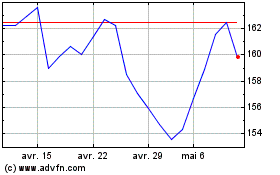Prepare for Rapid Air Travel Rebound, Airbus Tells Industry
27 Mai 2021 - 12:57PM
Dow Jones News
By Benjamin Katz
Airbus SE laid out a long-term plan to return aircraft
production to pre-pandemic levels, putting its suppliers and
customers on notice that it is betting air travel, and jet demand,
will bounce back quicker than others expect.
Airbus said it plans to lift production of its bestselling A320
narrow-body to 64 a month by the second quarter of 2023 -- topping
its 2019 average monthly output of 60. It set out a longer-term
ambition of reaching 70 a month at the beginning of 2024. That
could rise to 75 in 2025, the company said.
At the start of the crisis, Airbus cut rates across its programs
by roughly 40% and reduced its A320 output to 40 a month.
The new rate plan for the A320neo is "markedly higher" than
previous expectations, according to Sandy Morris, an aerospace
analyst at Jefferies in London. Jefferies had forecast an average
production rate of around 52 a month in 2023, and 57 a month in
2024. Airbus shares were up almost 6% in midday European
trading.
Industry executives have repeatedly said they expect travel
demand to stay below pre-Covid levels for years. While Airbus has
penciled in two full years before its factories are back where they
were before the crisis, it is essentially telling its
globe-spanning supply chain that the plane maker is sticking to
what has been for months a more optimistic forecast for air travel
recovery than many in the industry.
Amid severe supply-chain constraints in many other industries --
jolted as economies and demand snap back in many places -- Airbus
Chief Executive Guillaume Faury told his suppliers Thursday he
expects them to make the investment now needed to deliver parts and
services for a significantly ramped up production schedule down the
line.
"The aviation sector is beginning to recover from the Covid-19
crisis," Mr. Faury said in a statement outlining the higher
production targets. "The message to our supplier community provides
visibility to the entire industrial ecosystem to secure the
necessary capabilities and be ready when market conditions call for
it."
In early 2020, air travel all but disappeared as passengers
shunned the risk of getting on a plane amid the pandemic, and
governments enacted travel bans to try to prevent the spread of the
disease across borders.
Airbus slashed production and used the crisis to restructure its
manufacturing footprint. At the start of the pandemic, it outlined
plans to cut as many as 15,000 staff. It has also retooled
factories, consolidated locations and reorganized parts of its
business, particularly in its aerostructures units, to lower costs.
Mr. Faury, though, has pushed to keep production rates at a
high-enough level to protect Airbus's ability to ramp up quickly
when it sees the market recovering.
In recent months, domestic travel has bounced back strongly in
some big markets, including China and the U.S., as infection rates
drop and as a U.S. vaccination drive progresses relatively
quickly.
Airlines have started buying jets again. Airbus so far this year
has snatched new orders for 87 aircraft, including 25 of the
biggest A320 variant from Delta Air Lines Inc.
In promising higher production rates, Airbus may be able
negotiate better pricing with suppliers eager to ramp back up
themselves. It also signals to airlines and jet-leasing customers
that Airbus will be ready to deliver planes again once demand
returns. Before the crisis, Airbus and rival Boeing Co. struggled
under order backlogs that extended over years, often frustrating
customers with delivery delays.
"Airbus has clearly decided it needs to stress-test its
suppliers, and check that they actually can (and will) deliver to
higher rates," Sash Tusa, an analyst at London-based Agency
Partners, said. "It is also sending strong signals to customers,
including lessors, that it can and will deliver aircraft to
existing commitments."
Boeing, meanwhile, has outlined plans to increase its output to
31 737s a month in early 2022, with "further gradual increases to
correspond with market demand." Airbus has previously laid out
plans to reach production of 45 A320s a month by the second half of
this year.
Jefferies' Mr. Morris currently estimates Boeing's Max
production to be around five to six aircraft a month. Boeing
slowed, then temporarily halted, Max output after two deadly
accidents grounded the aircraft around the world.
Airbus also outlined Thursday production plans for its other
families of aircraft, including raising rates of its smallest A220
to six a month in early 2022 and to a rate of 14 by the middle of
the decade.
On its wide-body programs, Airbus is less ambitious, reflecting
industry expectations that long-haul flying will take longer to
recover. Before the pandemic, airlines were already starting to
shun bigger jets, favoring the more flexible, fuel-efficient single
aisles.
Airbus said it is aiming to lift its A350 production to six a
month from autumn next year. That compares with five now and as
many as 10 before the pandemic. It didn't outline a production
increase for its A330, which has struggled to sell. Production of
that plane will remain at an average rate of two a month, down from
around three to four before the crisis.
Write to Benjamin Katz at ben.katz@wsj.com
(END) Dow Jones Newswires
May 27, 2021 06:47 ET (10:47 GMT)
Copyright (c) 2021 Dow Jones & Company, Inc.
Airbus (EU:AIR)
Graphique Historique de l'Action
De Mar 2024 à Avr 2024

Airbus (EU:AIR)
Graphique Historique de l'Action
De Avr 2023 à Avr 2024
